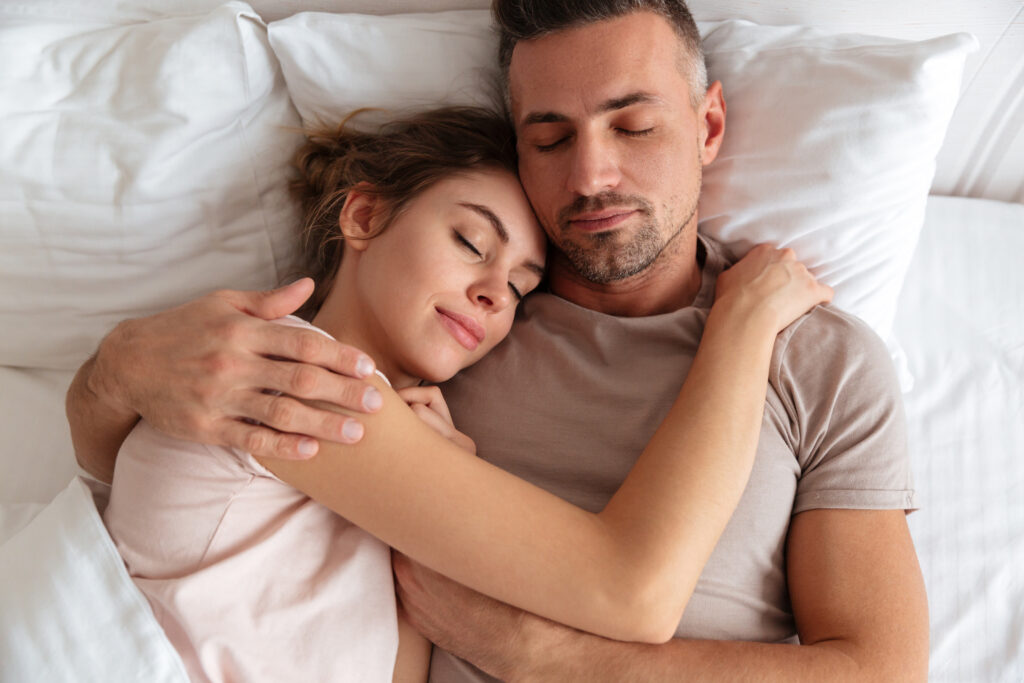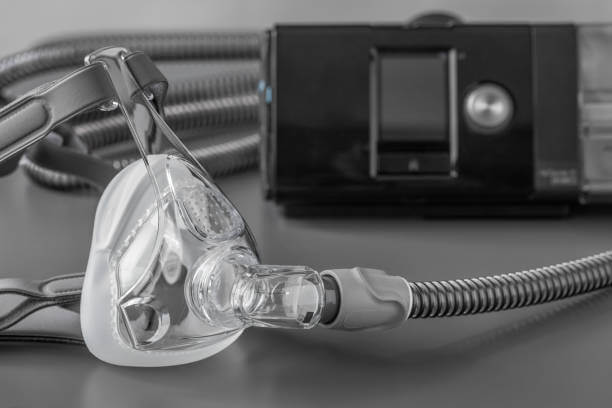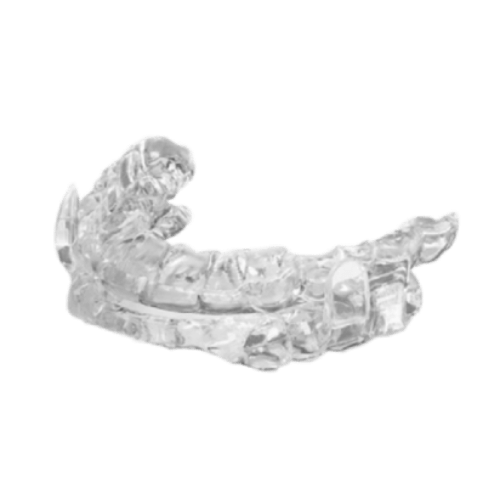
Snoring is normal, but loud snoring and interrupted by periods of silence may be a sign of obstructive sleep apnea (OSA). OSA is also associated with excessive tiredness, headaches, daytime sleepiness, and an inability to stay focused or alert during the day.
Fortunately, there are treatment options available for sleep apnea sufferers. Sleep apnea treatment will depend on the type and severity of your sleep apnea, and each is effective. Oral appliances and CPAP machines open obstructed airways, alleviate sleep apnea symptoms, and improve your quality of life.
If you or your partner suspects sleep apnea, there are a couple of types of treatment for sleep apnea. CPAP therapy is effective in treating sleep apnea, as it can offer a better quality of life without requiring surgery. There is, however, a limitation to CPAP: not everyone can tolerate it due to discomfort or medical reasons. In such cases, a dentist specializing in sleep apnea may recommend an alternative treatment option such as oral appliance therapy.
Continuous positive airway pressure (CPAP) machines and oral appliances may seem similar because they treat similar symptoms of obstructive sleep apnea. However, they differ in several ways. Specifically, CPAP machines are attached to a mask worn over the face while oral appliances are placed in your mouth.
After visiting a sleep clinic or taking a home sleep study, your sleep doctor or sleep specialist will review your results. A comprehensive sleep study performed in a facility that monitors your breathing, heart rate, brain activity, blood pressure, and oxygen levels during the night will give you the best results for treatment. Treating obstructive sleep apnea will depend on the severity of the disorder, where one of these two treatments, CPAP or oral appliance, might be right for you.
CPAP therapy is a proven intervention for sleep apnea patients who suffer from moderate or severe obstructive sleep apnea. The CPAP device improves sleep and oxygen levels in patients by delivering oxygen through a mask over the nose and mouth through a tube while they sleep. Using CPAP therapy reduces the risk of developing chronic diseases such as cognitive impairment, memory and attention problems, hypertension, stroke, diabetes, and cardiovascular disease. For CPAP treatment to work, it requires a commitment from the patient, and users who follow their treatment plan as prescribed, notice an immediate improvement in energy level and symptoms.
If the patient suffers a mild to moderate OSA, your sleep doctor will most likely use the most effective treatment for your condition, but this will depend on many factors, including your symptoms, how severe your OSA is, and your overall health. When given the option to decide, most patients opt for an oral appliance provided they may achieve similar results with less hassle of using a CPAP machine.

Patients using a CPAP Therapy will find advantages over the user of dental oral appliances. Among these advantages are the following:
While some patients have trouble getting used to them, some patients have noted the following disadvantages:

An oral appliance, also known as a dental appliance, sleep apnea dental device, or oral device, is a non-invasive cost-effective way to treat mild to moderate sleep apnea disorder. When using a sleep apnea dental appliance, it is a removable dental device that keeps your upper airway open and helps you breathe more easily when you sleep.
Depending on the severity of the obstructive sleep apnea disorder, using a dental appliance is a significant component of treatment for most people with mild to moderate forms of sleep apnea. These appliances look just like mouth guards and work by gently pushing the jaw forward, maintaining an open airway while you sleep. When you visit a dentist trained to practice dental sleep medicine, your dentist will create a custom-made sleep apnea oral appliance that is easy to sleep with. When in use, it can significantly reduce the severity of the condition, prevents you from snoring, and allow you to get a good night’s rest.
Patients using a sleep apnea dental appliance will find many advantages over the user of traditional CPAP machines. Among these advantages are the following:
For people with mild to moderate sleep apnea, using an oral appliance is often more effective than CPAP therapy. While some patients do have problems getting used to them, most concerns can be fixed easily during regular follow-up visits to ensure the fit and effectiveness of your dental appliance. Some patients have noted the following disadvantages:
Coverage for this treatment varies between medical insurance providers, so it’s important to check with your plan about coverage. If you’re not sure if it will be covered, we will be happy to help figure this out for you.
Most patients can use an oral appliance to treat their sleep apnea for two years before it needs to be replaced. The length of time the device lasts is affected by many factors, such as how often it is used, whether it is maintained and cleaned.
Your CPAP machine and accessories to treat sleep apnea must be carefully maintained in order to be effective, clean, and safe.
In general, over-the-counter oral devices should not be used for obstructive sleep apnea treatment. In certain situations, OTC oral devices might force the jaw in a position that makes it worse for the airway. Without the proper treatment and supervision from a health care professional, there are no benefits to these devices that outweigh the risks associated with using them.
Another alternative for people with sleep apnea is to try positional therapy or Nightlase laser treatment.
When combined with oral appliance therapy or the use of a CPAP, positional therapy is a technique that works to change sleep posture to improve breathing.
For patients looking not to use a device while they sleep, Sloan Creek Dental uses Nightlase laser treatment to decrease or tighten extra tissue in the mouth. The procedure is non-invasive and is done over a few sessions in the office.
Today, oral appliances are approved as an initial treatment for mild to moderate obstructive sleep apnea and as a severe sleep apnea treatment alternative to CPAP for those who cannot tolerate the devices and masks. For many people, using a dental appliance is a viable treatment alternative to CPAP because they’re easier to integrate into their lives without significant adjustments. If this idea sounds like a good fit for you, talk to your dentist specializing in sleep apnea to determine if you might be a candidate for an oral appliance.
Untreated sleep apnea can lead to feeling tired, lethargic, and can even serious health problems like risk of heart disease, stroke, and diabetes. At Sloan Creek Dental, we believe you deserve restful sleep. If you are interested in learning more about the cost of treating sleep apnea treatment or how we treat sleep apnea, contact our office online or call us at 972-468-1440, or leave us a message.
Our dental office is located in Fairview, Texas, and our patients visit us from across the surrounding areas, including Allen, Plano, McKinney, and Lucas.
We firmly believe that the internet should be available and accessible to anyone, and are committed to providing a website that is accessible to the widest possible audience, regardless of circumstance and ability.
To fulfill this, we aim to adhere as strictly as possible to the World Wide Web Consortium’s (W3C) Web Content Accessibility Guidelines 2.1 (WCAG 2.1) at the AA level. These guidelines explain how to make web content accessible to people with a wide array of disabilities. Complying with those guidelines helps us ensure that the website is accessible to all people: blind people, people with motor impairments, visual impairment, cognitive disabilities, and more.
This website utilizes various technologies that are meant to make it as accessible as possible at all times. We utilize an accessibility interface that allows persons with specific disabilities to adjust the website’s UI (user interface) and design it to their personal needs.
Additionally, the website utilizes an AI-based application that runs in the background and optimizes its accessibility level constantly. This application remediates the website’s HTML, adapts Its functionality and behavior for screen-readers used by the blind users, and for keyboard functions used by individuals with motor impairments.
If you’ve found a malfunction or have ideas for improvement, we’ll be happy to hear from you. You can reach out to the website’s operators by using the following email
Our website implements the ARIA attributes (Accessible Rich Internet Applications) technique, alongside various different behavioral changes, to ensure blind users visiting with screen-readers are able to read, comprehend, and enjoy the website’s functions. As soon as a user with a screen-reader enters your site, they immediately receive a prompt to enter the Screen-Reader Profile so they can browse and operate your site effectively. Here’s how our website covers some of the most important screen-reader requirements, alongside console screenshots of code examples:
Screen-reader optimization: we run a background process that learns the website’s components from top to bottom, to ensure ongoing compliance even when updating the website. In this process, we provide screen-readers with meaningful data using the ARIA set of attributes. For example, we provide accurate form labels; descriptions for actionable icons (social media icons, search icons, cart icons, etc.); validation guidance for form inputs; element roles such as buttons, menus, modal dialogues (popups), and others. Additionally, the background process scans all of the website’s images and provides an accurate and meaningful image-object-recognition-based description as an ALT (alternate text) tag for images that are not described. It will also extract texts that are embedded within the image, using an OCR (optical character recognition) technology. To turn on screen-reader adjustments at any time, users need only to press the Alt+1 keyboard combination. Screen-reader users also get automatic announcements to turn the Screen-reader mode on as soon as they enter the website.
These adjustments are compatible with all popular screen readers, including JAWS and NVDA.
Keyboard navigation optimization: The background process also adjusts the website’s HTML, and adds various behaviors using JavaScript code to make the website operable by the keyboard. This includes the ability to navigate the website using the Tab and Shift+Tab keys, operate dropdowns with the arrow keys, close them with Esc, trigger buttons and links using the Enter key, navigate between radio and checkbox elements using the arrow keys, and fill them in with the Spacebar or Enter key.Additionally, keyboard users will find quick-navigation and content-skip menus, available at any time by clicking Alt+1, or as the first elements of the site while navigating with the keyboard. The background process also handles triggered popups by moving the keyboard focus towards them as soon as they appear, and not allow the focus drift outside of it.
Users can also use shortcuts such as “M” (menus), “H” (headings), “F” (forms), “B” (buttons), and “G” (graphics) to jump to specific elements.
We aim to support the widest array of browsers and assistive technologies as possible, so our users can choose the best fitting tools for them, with as few limitations as possible. Therefore, we have worked very hard to be able to support all major systems that comprise over 95% of the user market share including Google Chrome, Mozilla Firefox, Apple Safari, Opera and Microsoft Edge, JAWS and NVDA (screen readers), both for Windows and for MAC users.
Despite our very best efforts to allow anybody to adjust the website to their needs, there may still be pages or sections that are not fully accessible, are in the process of becoming accessible, or are lacking an adequate technological solution to make them accessible. Still, we are continually improving our accessibility, adding, updating and improving its options and features, and developing and adopting new technologies. All this is meant to reach the optimal level of accessibility, following technological advancements. For any assistance, please reach out to